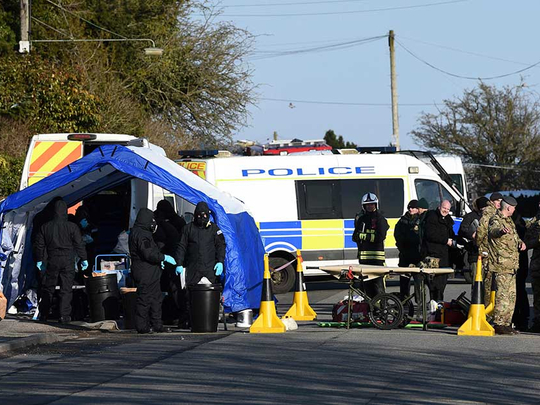
MOSCOW/London: The British ambassador will snub a meeting that the Russia foreign ministry called to explain Moscow’s view on the poisoning of an ex-double agent in England, the embassy said Wednesday.
“The ambassador will not be attending the meeting,” Zeenat Khanche, spokeswoman for the British embassy in Moscow, told AFP.
Instead, the diplomatic mission considered sending to the meeting an official at the “working level,” added Khanche, declining to provide further details.
The head of the Delegation of the European Commission to Russia will also not attend because “he is not the country,” its spokeswoman, Luca Eszter Kadar, told AFP.
Instead, his deputy, Sven-Olov Carlsson, will attend the gathering, she said.
On Tuesday, Moscow had invited all ambassadors to Russia to a meeting with foreign ministry experts to hear Russia’s views on the poisoning of a former double agent in England.
Vladimir Yermakov, director of the ministry’s non-proliferation and arms control department, will brief foreign embassy representatives at 1200 GMT Wednesday, an official told AFP.
The March 4 nerve agent attack on former double agent Sergei Skripal and his daughter Yulia in the English city of Salisbury has led to a crisis in ties between Moscow and London.
Britain says only Russia had the capability, motive and intent to be behind the attack, in which it says the nerve agent Novichok, developed by the Soviet Union, was used.
Russia denies any responsibility.
‘Absurd situation’
Foreign ministry spokeswoman Maria Zakharova has said Wednesday’s meeting would be an opportunity for “Russia’s view to be expressed to official representatives of foreign states.”
The meeting would be with “leaders and experts from the department charged with non-proliferation and arms-control issues,” she added.
Britain has thrown out 23 Russian diplomats over the attack, prompting a tit-for-tat response from Moscow.
The Kremlin said on Wednesday that a decision by the British ambassador to skip a Russian briefing on the poisoning of former Russian spy Sergei Skripal and his daughter in Britain showed London was unwilling to listen to Moscow’s side of the story.
The nerve agent attack in England has plunged ties between London and Moscow into their worst crisis since the Cold War.
Britain has blamed Russia for the attack, something Moscow denies, and both have expelled diplomats in the standoff.
A British embassy spokesman said on Wednesday that the UK ambassador, Laurie Bristow, would not attend the briefing with arms controls experts at the Russian Foreign Ministry, but that London was considering sending someone else.
“It’s another vivid example of the absurd situation when questions are asked and an unwillingness to hear even any answers is demonstrated,” Kremlin spokesman Dmitry Peskov told reporters on a conference call.
Russia, which has so far refused to explain how Novichok, a nerve agent first developed by the Soviet military, was used to strike down Skripal, had invited foreign ambassadors to attend the briefing later on Wednesday to discuss the case.
It was unclear who, if anyone, Britain would send.
“The ambassador will not attend and we are considering whether to send a representative at working level,” a British embassy spokesman said.
Russian news agencies reported that other ambassadors, including that of the United States and France, would not attend either.
Speaking on a visit to Japan, Russian Foreign Minister Sergei Lavrov said earlier on Wednesday that Russia wanted Britain to tell it where Skripal and his daughter, Yulia, were currently located.
Lavrov said Moscow also wanted to know why the British government had accused Russia of responsibility when the police investigation into the Salisbury incident was incomplete.
“Overall there is no doubt that the current British leadership has consciously taken a course to undermine Russian-British relations,” Lavrov said at a news conference with his Japanese counterpart Taro Kono in Tokyo, according to a transcript on the Russian foreign ministry website.
“If this will continue in the form of any tangible new anti-Russian actions then of course nobody has cancelled the principle of reciprocity. It would be good for everyone and for [the British government] if they stopped getting agitated and calmed down.”












